Are Manchester, Vermont and new Boston Bruins coach Danielle Marmer the secret sauce that just fueled the Bruins’ best season ever?
STORY BY TIM RHYS
PHOTOGRAPHY COURTESY DANIELLE MARMER
Clearly the Boston Bruins are living right. No team in the 105-year history of the National Hockey League has ever won more games than the powerhouse 2023 Bruins, and no NHL team before them ever started the season with a female on-ice coach, much less one who learned to win in a small, tightknit New England town like Manchester, Vermont. And while these facts may seem more random than correlated… are they, really? Maybe there’s more to the story.
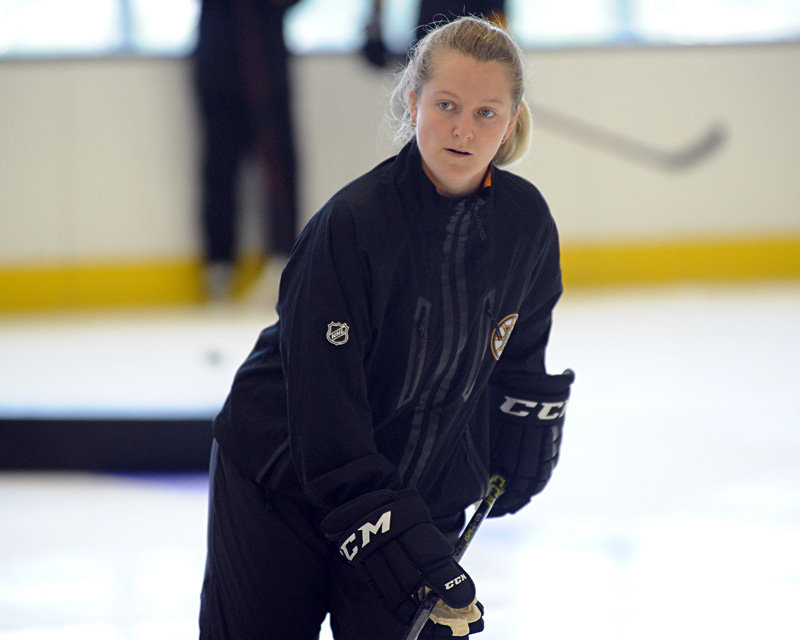
What if someone (whose tongue were well-positioned in cheek) told you that a plausible case could be made that last July’s historic hiring of Danielle Marmer, an impressive young Vermont woman who learned to skate and play hockey at Manchester’s Riley Rink and won a state hockey championship for Manchester’s Burr and Burton Academy, was the catalyst for the Bruins’ astonishing 2022-2023 season? What if they told you it could be backed up by science?
Dubious? No one would blame you. But consider, if you will, that luck plays a pivotal role in a preponderance of human endeavors, and that sports are hardly an exception. The question is, can it really stand up to science? How much of a factor is “luck,” anyway? Can it be measured?
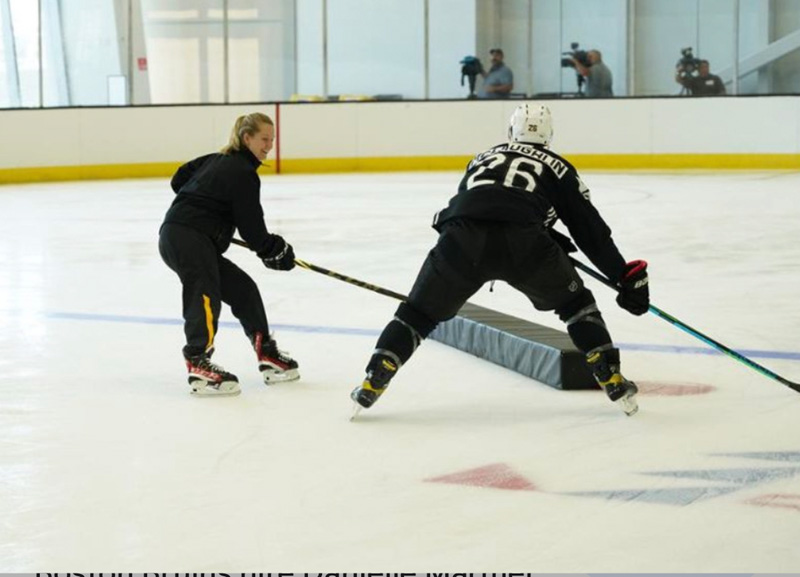
Funny you should ask. At least when it comes to sports and gaming, recent research has shown that luck can indeed be scientifically measured. In his book The Success Equation, investment strategist and sports fan Michael Mauboussin outlines a statistical technique that ranks the five major sports by the relative contributions of skill and luck to regular season standings. And lo, “Mauboussin’s Continuum” demonstrates that the league where luck comes into play the most is (drumroll please)… the NHL. More than the NFL, MLB, NBA, or the Premier League. You can look it up, as baseball sage Casey Stengal used to say, and it’s quite convincing. So especially for hockey players, there’s little doubt that having plenty of the good kind of luck isn’t just helpful, it’s actually essential to winning a lot of games.
So—at least by certain parameters— luck can indeed be measured, but can it also be “made?” That’s the trickier question, but the answer might well be affirmative, too. Because if we take this “making your own luck” business a step further we begin to rub elbows with quantum physics, which has some interesting things to say about the efforts we make in life and how each action is an essential link in a predestined chain of events. We think we have free will, but that’s illusory because every decision we make is part of a chain of events that’s out of our control.
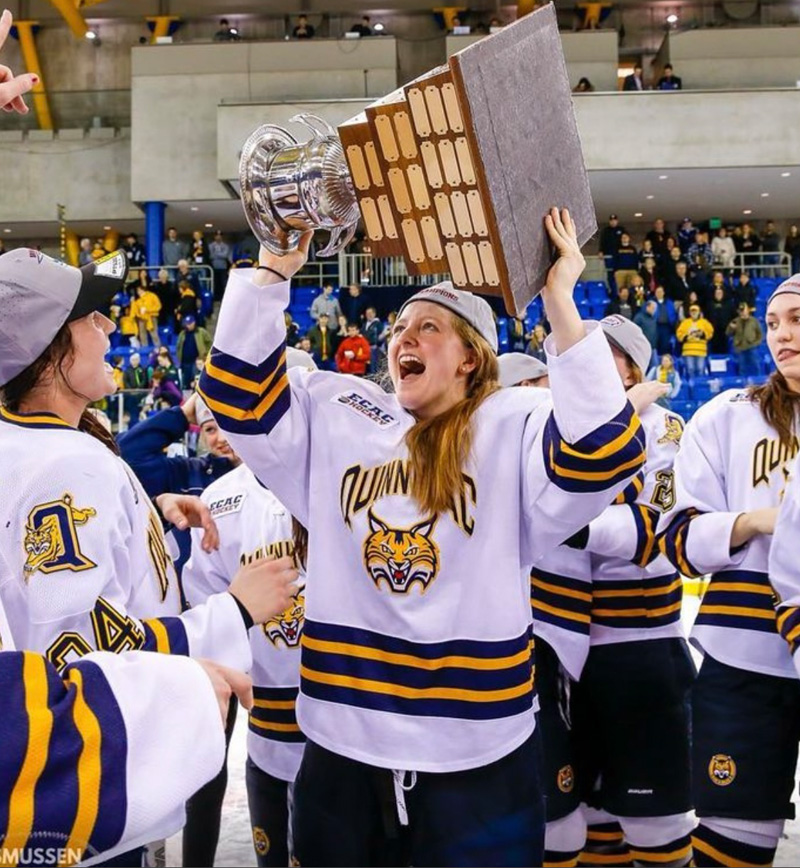
So how does all this relate to Danielle Marmer and the making of the hockey juggernaut that is the supremely successful (and thus supremely “lucky”) 2023 Boston Bruins? Physics tells us that we simply draw a direct causality line from the franchise’s groundbreaking decision last summer to make Danielle the first woman in history to have an on-ice coaching position in the NHL to the team’s achieving its winningest season in the history of the league a few short months later. If this seems implausible, look at the circumstantial evidence. The salient facts are that the Bruins had never done anything like this before— made a hire like this … or won like this. But in 2023, they did both – and thereby became hockey’s posterchild for making one’s own luck. As Mr. Mauboussin writes, science shows that hockey teams must get lucky to win, and the Bruins got lucky more often than any NHL team ever had. And just how did that happen? What was the one ice-ceiling-shattering, history-making change the club made going into its record-breaking season, you ask? The hiring of Danielle Marmer, of course. As Einstein might have said, she was the team’s glorious cause of their ridiculously successful effect. Their good luck charm, if you will…a case of destiny if ever there was one.
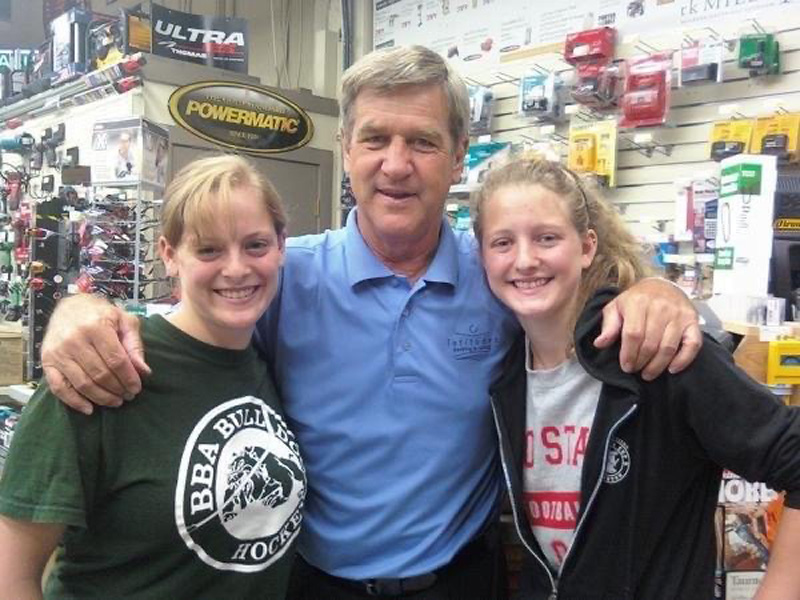
But let’s back this story up a bit, shall we? Predetermination and Einstein aside, how did it come to pass that Danielle was able to make her own luck and touch off the chain of events that put her in a position to win the Bruins job in the first place? On a pleasant two-hour Zoom call from her current home in Boston, she related the whole unlikely, inspirational story. It all started when she was three years old and her family moved to Vermont from Foxboro, Massachusetts. The family settled in Dorset, a tiny, picture-perfect community of 2,000 souls a stone’s throw away from Manchester, the hub of the region (or the north “shire town,” as locals refer to it) and home to the lauded high school, Burr & Burton Academy, which is why many parents of school-aged children choose the area. To get herself and her daughters involved in the community, Danielle’s mother, Susan, founded a figure-skating club at the town’s ice rink. Soon she became the manager and eventually, Danielle says, she and her sisters Whitney and Abby practically started living there.
“It was the largest youth organization in the area at the time,” says Danielle’s father, Gary. “Whitney was actually the best skater in the family, but Danielle was also very good. Whitney went to UVM and played club hockey. And Abby was Player of the Year when she was on the [Burr & Burton] Bulldogs and went on to play Division I hockey for Middlebury College. I know the media cares about what Danielle is doing, but I’m proud of all three of my daughters,” says Gary, who despite not being a hockey player himself, was the girls’ enthusiastic coach when they were young. “My superpower was not skills, it was getting the kids to play together.”
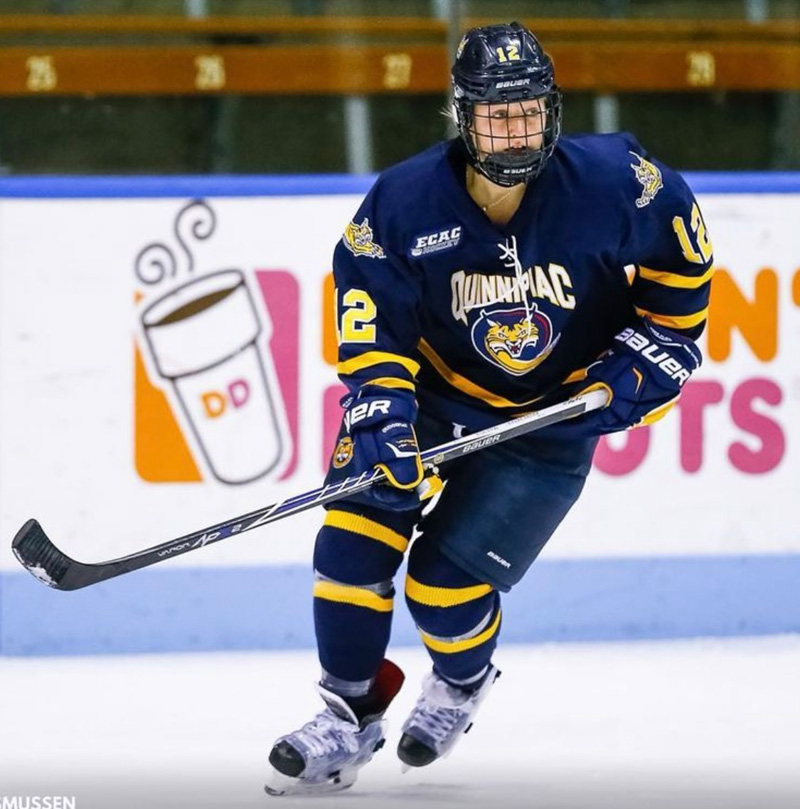
Manchester’s Riley Rink seems to have served the young women very well. “My best friend and I used to bike there from our houses all the time,” Danielle says. “They had ‘summer ice’ so we used to spend all day there, we even had our own lockers and kept all sorts of stuff there like scooters, bikes, game cube, hockey stuff. We’d hang out at the Rec (Manchester’s Dana Thompson Memorial Park) and then bike back to the rink, get on the ice and play stick-and-puck or do a public skate. And then we’d bike into town and go get a sandwich from Discount Beverage. The rink was our landing pad, and we’d do that all the way up to high school. It was the best place to grow up.”
Grow up she did, strong and athletic. And, as the middle-born of the three gifted sports-playing daughters of Gary and Susan Marmer, she was also extremely competitive.
“Danielle had a voracious appetite for sports,” Gary says. “And she excelled at everything she did.” Though she played other sports (she was a softball catcher whose hero was Red Sox Hall of Famer Jason Varitek), at Burr and Burton she shined on the ice. Her sister Whitney was a senior when Danielle was a freshman and some of Danielle’s fondest hockey memories are from that year, which culminated in Danielle and Whitney playing for the team that won the state championship.
After that experience, Danielle got even more serious about hockey and the Marmer family decided to give Danielle her best shot at national exposure, so she started boarding school at Loomis Chaffee in Connecticut. While there, Danielle also played on a weekend club team called the Connecticut Polar Bears, where she got her first tournament exposure and went to the nationals. When it was time to choose a college she was an “on the bubble” player who was able to play Division I hockey, but at DI recruiting interviews, she recalls coaches cautioning her that it could be a battle for her to get playing time. But her competitive nature wouldn’t let her hear it.
“My attitude was that I’ve figured it out everywhere I’ve been, I’ll figure it out there, too. And then after a year or so, I’ll naturally become better and they’re gonna want to play me all the time. I really believed that. Not in an arrogant way…”
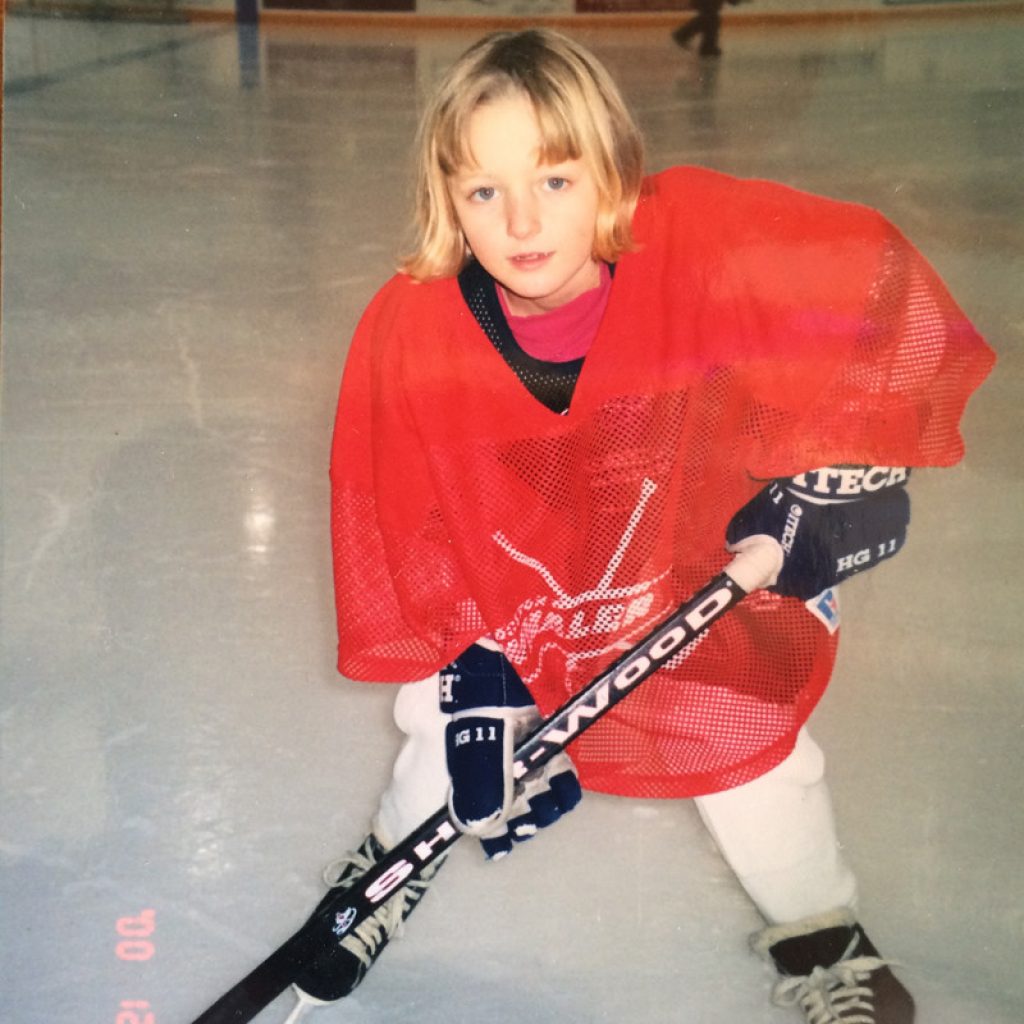
After flirting with a couple of other schools and coming close to choosing Middlebury, she eventually committed to Quinnipiac University, a school that made no secret of how much they wanted her. The decision eventually turned out to be a good one, but in the beginning Danielle questioned her choice. She found herself facing some adversity for the first time, and her confidence was shaken.
“For a few reasons, I think I just wasn’t prepared for it. I was this big fish in a small pond and was seeing a lot of success, and I didn’t have people around me who had experienced college hockey. So, I didn’t know what I didn’t know. I didn’t know how much harder it was going to be once I got there. No one told me how much better everyone was going to be. I’m suddenly competing against Canadians and Europeans—and on top of that—our head coach liked to motivate by fear. I had the hardest time relating to him, trusting him, or feeling like we had any kind of relationship. He had these old school ways that don’t work anymore.”
Everything changed with the hiring of new head coach Cass Turner, who became a mentor. She helped Danielle understand the kind of impact she could have off the ice, behind the scenes… because she knew that Danielle was someone who never minded not taking all the glory, but instead enjoyed giving it to other players. In essence, she fostered a “culture of compassion,” as Cass calls it, and naturally had the kind of personality that lent itself to coaching.
“Cass is super nice to say that about me,” Danielle says. “I was a very social person growing up, so it’s no surprise that I loved team sports. I played so many of them growing up. As far as team culture, though, I didn’t know what that was or what I was doing [in college], I just knew that I really enjoyed spending time with my teammates and wanted to have a good time and succeed with them. Cass saw how strong my relationships with the other players were and sort of spun that to work for her and the program. Because, as I’ve learned as a coach, people like me are some of the most dangerous on a team, because we can pull the team in a positive or a negative direction. I’m not saying that I was the most influential person on the team, but I was an outgoing, friends-with-everybody person, but if I was in a bad place or being negative, that could affect everyone else. I could be the ‘bad apple,’ for sure.
“I also think it was important for her to make sure that I was on the right path. Going into my junior year, we had a meeting. She’d seen I was sort of struggling and unhappy and she asked me what I wanted to get out of my last two years. How were we going to find a way to get over the hump and get through the adversity? She said ‘You’re the social leader on the team, your teammates respect you, so how can we use that to catapult you into a situation where you’re finding more success?’ She said, ‘You’re really supportive and loud, even in the weight room. Just focus on that and let it trickle into what happens on the ice. Just always bring that with you.’ And that’s exactly what happened. I didn’t hate being at the rink anymore, I was hyping people up, celebrating, letting them know when they were doing things well. I used to think I’d have to score a goal for anyone to notice me or I’d have to go out there and make some amazing miraculous play in order to get a consistent role on a line. And that went away.”
Danielle began to realize that her “weaknesses” were actually her strengths, and that has translated into her becoming a great coach. She keeps in touch with friends who also went into coaching, and some of them who were gifted players have a very difficult time explaining certain skills and breaking it all down. But because it didn’t always come naturally to Danielle and she had to learn each step in that skill in order to achieve it and to do it well, she knows how to translate that knowledge to young players.
She recently received a call from a friend and former college teammate who got a job coaching college hockey. The friend was frustrated by how many meetings she needed to have with fourth line players who don’t play that much. “I remember thinking I was that kid, Danielle says. “I know exactly what those kids are feeling. I think my experience lends itself to relating to a bigger group of players… to more of the team. And you think about what Cass did for me. You know, on one level, it was super selfless, she wanted the best for me. On the other, it was a selfish motivation because she wanted the team to do well. Like I can’t lose Danielle and have her drag the team down with her. So I need to get her on board. And that taught me that the bottom kids matter a lot.”
Cass proved to be a shrewd and compassionate leader, and that combination is hard to beat. In her first season as head coach with Danielle in her corner, the Bobcats had an historic 30-win season that culminated in an ECAC championship. Later, Cass was quick to deflect credit. “Danielle might have been the most important person on our team,” she said.
And Cass was instrumental in Danielle’s career trajectory. It was Cass who first noticed an ad for a Diversity and Inclusion internship with the Bruins, she suggested Danielle apply, and the rest is history. Literally.
But though she is the first female on-ice coach, don’t dare call her a “trailblazer,” because Danielle is sensitive to the fact that there are many other women doing “incredible work” in NHL hockey.
Danielle remembers the shock of actually being hired and the nerves she felt in her first few weeks on the job.
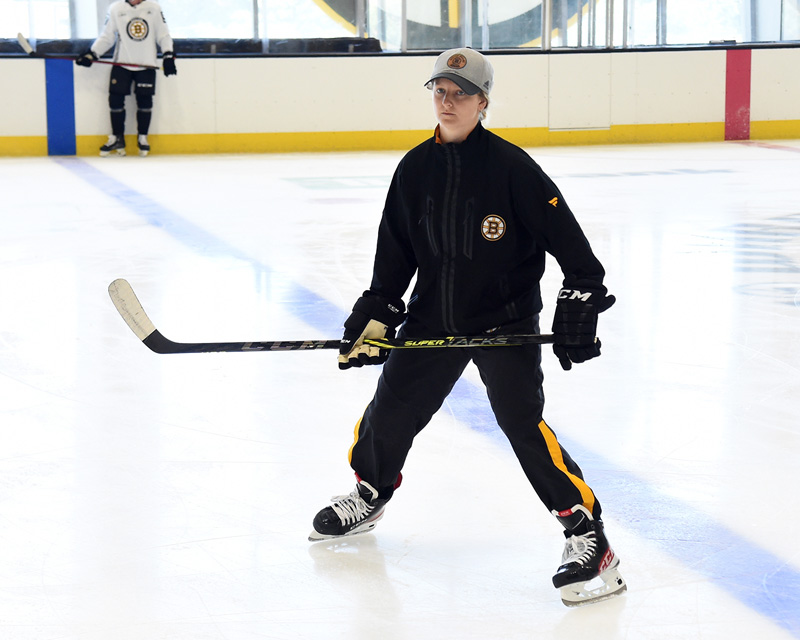
“When I got hired and they were like, ‘Hey, can you get to the draft?’ I think I got hired on a Monday, and they asked me if I could get to the draft on Wednesday. I was in Montreal. So I remember going into sort of fight or flight like adrenaline mode and just like, I gotta get through this. We’re going to the draft. I’m scared as hell, meeting the entire staff for the first time. It was really nerve-wracking. The first night, it’s a dinner with the entire staff. I walk into a room of 40 men, everyone sitting at tables. It was intimidating. They do this “rookie party,” thing where they have all the new staff members go up and introduce themselves and tell jokes or a story. I remember pretty much blacking out through that and then all the sudden, I’m on the ice in Boston for development camp.
I’m embarrassed to say that I didn’t, at first, understand that it was an on-ice position. When it got announced, I honestly thought people were misspeaking. Like they kept saying “the first on-ice female,” and I honestly thought it was a mistake.
“I look back at that first week and I was just sort of faking my way through it. I felt like I’ve learned so much since then, it gives me a lot of confidence going into this summer’s development camp. But I look back on it now and think, how did I get through that? It’s just the adrenaline and you’re like, Okay, I just have to do this and then I’m done. I think remembering my time at Quinnipiac, all that adversity, and I’m like you know what? Nothing is going to be that hard.”
And so far, Danielle says, she hasn’t really experienced sexism in the NHL.
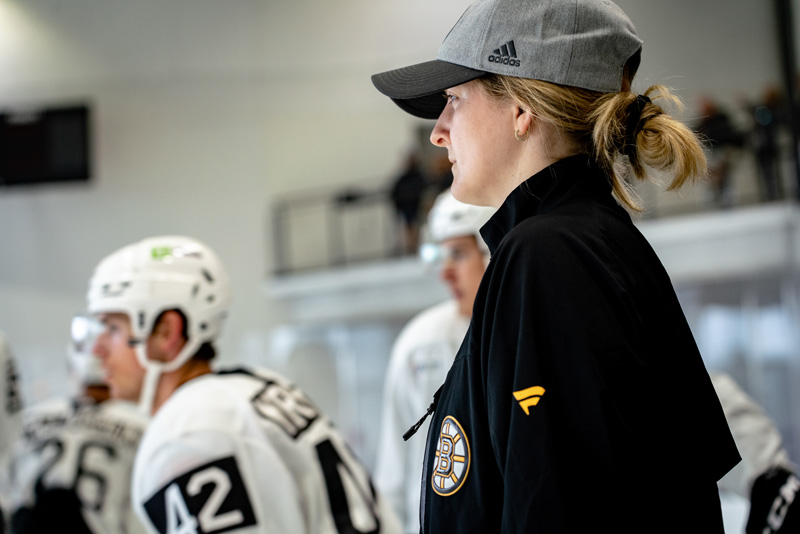
“Everybody has been so welcoming and kind. I can’t say enough good things about this organization. I really can’t. I’m not naive enough to say that sexism is completely gone, because I’ve heard the stories. But no, I haven’t yet encountered a situation where I’ve been uncomfortable in that way. There’s such an effort now. And I believe that playing women’s sports is just about the most progressive world you can be in… [The Bruins] want to educate people about the sport who aren’t typically from hockey communities. They want to grow the game for women, but also for people of color, for the indigenous communities, for communities that don’t traditionally have representation in the NHL.”
These days Danielle is working in player development with drafted (but unsigned) players. It’s a job that has a lot of moving parts and involves watching their games and going to their practices when she can. She monitors dozens of players at several schools from Ontario and Quebec to Ohio, North Dakota, and Minnesota… she travels to four or five games a week to see them play, watches video and prepares tape weekly… has conversations with them all, about hockey, but also just to check in and see how they’re doing with all the pressures of college life.
And does she ever feel any pressure herself, as the first NHL woman with an on-ice coaching position?
“Sure, I guess a little bit,” she admits. “But I don’t think about it too much. I have confidence in my ability to do this job well. And I try to lean on that feeling more than I think about the pressure. I also know I’m not important enough that if I fail I’m going to be the reason that women are no longer hired in the NHL. There are other women who are doing incredible things in the NHL. And so, collectively, I hope that our group continues to carve that path.”
As fulfilling as this new position is, Danielle is always a big picture person who has one eye on the future.
“I’m loving this experience,” she says. “I do want to keep the door to college hockey open just because I loved that experience, too, and I sometimes miss having a direct impact on the game and being on the bench with them in games. So I could see myself doing that at some point, but I’m not anywhere near wanting to leave this to go do that anytime soon, because I’m learning so much by seeing the scale and perspective on the men’s side. What’s really cool about player development is it really is a starting point for a lot of different paths in the NHL. I want to continue to work my way up and continue to be better than I was before. But I don’t think too much about things like being a general manager, for instance. I mean, ideally, yes, in the future, that would be wonderful. But right now, I’m just focused on doing this job really, really well. Because I know that there are a lot of people looking at the women in the NHL, and if I don’t do well, then that might limit the girls coming up and their ability and their opportunities. So I want to make sure that I keep the door open by doing this job right now the best I can. Right now that’s all I want to do. “
As for the future, Danielle has a maxim she likes to lean on. “To me, the only ceiling is perception,” she likes to say. Cass Turner puts it even more succinctly: “There’s no ceiling for Danielle.”
Regardless of her career ambitions, Danielle says she’ll always come back to Vermont. “I try to get back at least every couple of months,” she says. “My parents are still in the same house in Dorset.”
ALL THE DETAILS
NHL.COM